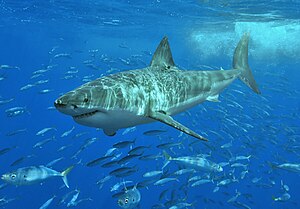 |
| Great White Shark (Photo: Wikipedia) |
Whether it’s from fishing and by-catch, finning or even culling, global shark populations are under a growing threat from human activity.
But how successful is international law at protecting some of the planet’s oldest species?
Only two of the global legal instruments that protect sharks are legally binding: the Convention on Migratory Species (CMS) and the Convention on International Trade in Endangered Species (CITES).
While there are other non-binding agreements aimed at addressing shark conservation and management, the overall legal framework is not comprehensive. The result is that international law offers at best only a limited level of protection for sharks.
The Convention on Migratory Species (CMS)
When species are listed under the CMS they are protected throughout their migratory range. Three shark species are listed on Appendix I: the Whale Shark, Basking Shark and Great White Shark. This means any states in their “range” must prohibit catching the species.Range states include those countries in whose waters the species are found, and nations who register vessels that fish on the high seas.
Four further species are listed on Appendix II: the Porbeagle, Spiny Dogfish, Short Fin and Long Fin Mako. For these species, range states have to enter into agreements with each other to protect them.
CMS signatories signed up to a Memorandum of Understanding on sharks in 2010. In September 2012 they agreed involvement in CMS should go beyond States and that NGOs, scientists and fishing industry representatives also needed to be involved. Relevantly, the US and Australian chapters of the Humane Society International signed on to the Memorandum.
Importantly, the parties adopted a Conservation Plan for sharks. This recognises the importance of research, sustainability of fisheries, protection of critical habitats, public education and international cooperation.
The meeting also recommended that sharks be landed with their fins naturally attached. This measure is aimed at reducing the abhorrent practice of live finning - the fins are cut off the shark while it is alive, and the shark is left to bleed to death or drown. In some cases the sharks are dead when the fins are removed but the bodies are still wastefully discarded.
This finning should be distinguished from circumstances where sharks are landed whole and their meat and fins separately sold. It is the former practice that is most controversial, unsustainable and breaches guidelines on responsible fishery practice.
The shark fin industry is driven by the high prices fishers can get for fins. Meat is not as profitable. This recommendation is therefore a significant advance. It follows a 2008 UN General Assembly Resolution and comes in the wake of shark fin regulations in countries such as the US, and a number of Pacific nations.
Although not legally binding on countries, the recommendation illustrates growing consensus on the need to address shark finning and endorses the “fins naturally attached” approach. The recommendation will hopefully catalyse the development of binding regulations in regional fishery management organisations and at the national level as well.
Although the global community acknowledges the poor conservation status of some shark species, ultimately, the CMS Memorandum is not legally binding and only covers the seven species listed under the Convention. Furthermore, only 50 states have signed the document and by extension committed to the Conservation Plan.
To read further, go to: http://theconversation.edu.au/shark-protection-developments-have-no-bite-10068?utm_medium=email&utm_campaign=Latest+from+The+Conversation+for+5+November+2012&utm_content=Latest+from+The+Conversation+for+5+November+2012+CID_0a067ac95fb97e59de1e5e40b0ea6ce6&utm_source=campaign_monitor&utm_term=Shark%20protection%20developments%20have%20no%20bite

No comments:
Post a Comment